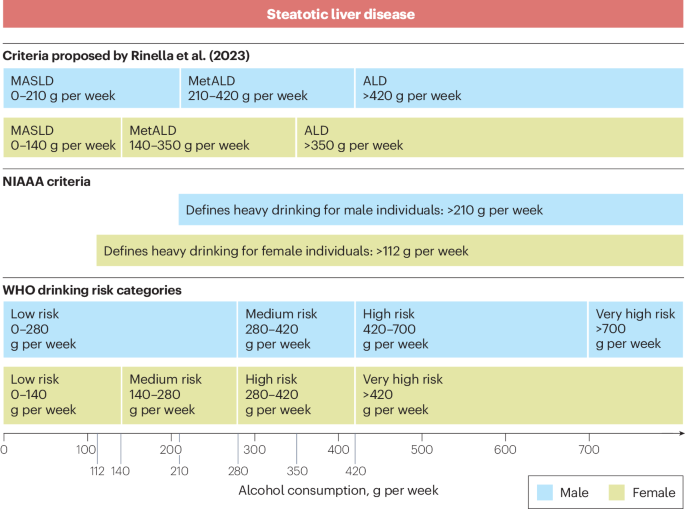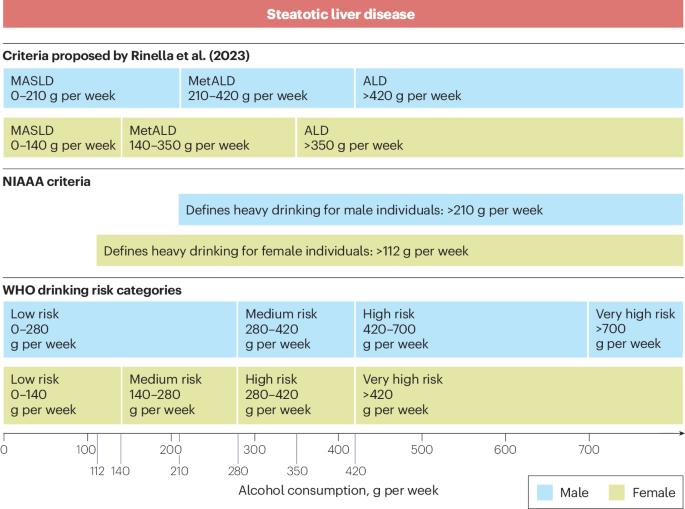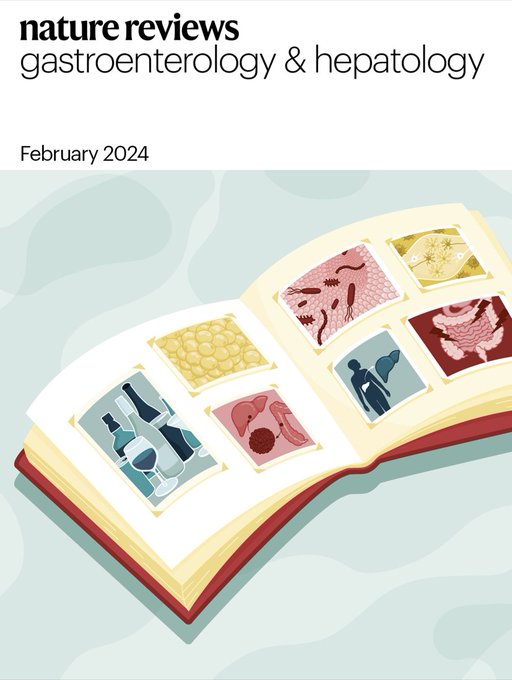设计针对饮酒和酒精相关肝病的临床试验:专家小组共识声明
IF 45.9
1区 医学
Q1 GASTROENTEROLOGY & HEPATOLOGY
引用次数: 0
摘要
大多数酒精相关性肝病(ALD)患者都有大量饮酒的习惯,女性指每天饮酒 4 杯(56 克)或每周饮酒 8 杯(112 克)或以上,男性指每天饮酒 5 杯(70 克)或每周饮酒 15 杯(210 克)或以上。虽然确诊 ALD 后戒酒可改善预期寿命并降低肝病失代偿的风险,但很少有研究评估治疗酒精使用障碍是否会减少肝病进展并改善肝脏相关预后。2021 年 11 月,美国国家酒精滥用和酒精中毒研究所委托一个包括肝病专家、成瘾医学专家、统计学家、临床试验专家和监管机构成员在内的特别工作组,为设计和开展临床试验制定建议,以评估酒精使用的影响,特别是减少或消除 ALD 患者酒精使用的治疗。特别工作组对酒精使用障碍和 ALD 的相关文献进行了广泛的审查。在一次面对面的会议上介绍了研究结果,并在接下来的 16 个月中进行了讨论,以制定最终建议。由于很少有临床试验直接涉及这一主题,因此工作组全体成员批准的 28 项建议代表了专家的一致意见。本文章由计算机程序翻译,如有差异,请以英文原文为准。


Designing clinical trials to address alcohol use and alcohol-associated liver disease: an expert panel Consensus Statement
Most patients with alcohol-associated liver disease (ALD) engage in heavy drinking defined as 4 or more drinks per day (56 g) or 8 (112 g) or more drinks per week for women and 5 or more drinks per day (70 g) or 15 (210 g) or more drinks per week for men. Although abstinence from alcohol after diagnosis of ALD improves life expectancy and reduces the risk of decompensation of liver disease, few studies have evaluated whether treatment of alcohol use disorders will reduce progression of liver disease and improve liver-related outcomes. In November 2021, the National Institute of Alcohol Abuse and Alcoholism commissioned a task force that included hepatologists, addiction medicine specialists, statisticians, clinical trialists and members of regulatory agencies to develop recommendations for the design and conduct of clinical trials to evaluate the effect of alcohol use, particularly treatment to reduce or eliminate alcohol use in patients with ALD. The task force conducted extensive reviews of relevant literature on alcohol use disorders and ALD. Findings were presented at one in-person meeting and discussed over the next 16 months to develop the final recommendations. As few clinical trials directly address this topic, the 28 recommendations approved by all members of the task force represent a consensus of expert opinions. Alcohol-associated liver disease is the main cause of liver-related morbidity and mortality globally. This Consensus Statement makes recommendations for the design, best practice and conduct of clinical trials to evaluate the effects of alcohol use in alcohol-associated liver disease and alcohol use disorder.
求助全文
通过发布文献求助,成功后即可免费获取论文全文。
去求助
来源期刊
CiteScore
52.30
自引率
0.60%
发文量
147
审稿时长
6-12 weeks
期刊介绍:
Nature Reviews Gastroenterology & Hepatology aims to serve as the leading resource for Reviews and commentaries within the scientific and medical communities it caters to. The journal strives to maintain authority, accessibility, and clarity in its published articles, which are complemented by easily understandable figures, tables, and other display items. Dedicated to providing exceptional service to authors, referees, and readers, the editorial team works diligently to maximize the usefulness and impact of each publication.
The journal encompasses a wide range of content types, including Research Highlights, News & Views, Comments, Reviews, Perspectives, and Consensus Statements, all pertinent to gastroenterologists and hepatologists. With its broad scope, Nature Reviews Gastroenterology & Hepatology ensures that its articles reach a diverse audience, aiming for the widest possible dissemination of valuable information.
Nature Reviews Gastroenterology & Hepatology is part of the Nature Reviews portfolio of journals.

 求助内容:
求助内容: 应助结果提醒方式:
应助结果提醒方式:


